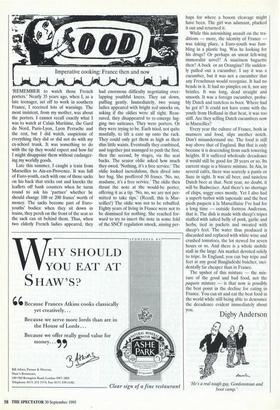Imperative cooking: France then and now `REMEMBER to watch those
French porters.' Nearly 35 years ago, when I, as a late teenager, set off to work in southern France, I received lots of warnings. The most insistent, from my mother, was about the porters. I cannot recall exactly what I was to watch at Calais Maritime, the Gard du Nord, Paris-Lyon, Lyon Perrache and the rest, but I did watch, suspicious of everything they did or did not do with my ex-school trunk. It was something to do with the tip they would expect and how far' I might disappoint them without endanger- ing my worldly goods.
Late this summer, I caught a train from Marseilles to Aix-en-Provence. It was full of Euro-youth, each with one of those sacks on his back that sticks out and knocks the leaflets off bank counters when he turns round to ask his 'partner' whether he should change 100 or 200 francs' worth of money. The sacks become part of Euro- youths' bodies: when they sit down in trains, they perch on the front of the seat so the sack can sit behind them. Thus, when two elderly French ladies appeared, they had enormous difficulty negotiating over- lapping youthful knees. They sat down, puffing gently. Immediately, two young ladies appeared with bright red smocks on, asking if the oldies were all right. Reas- sured, they disappeared to re-emerge lug- ging two suitcases. They were porters. Or they were trying to be. Each tried, not quite manfully, to lift a case up onto the rack. They could only get them as high as their slim little waists. Eventually they combined, and together just managed to push the first, then the second, by stages, via the seat backs. The senior oldie asked how much they owed. 'Nothing, it's a free service.' The oldie looked incredulous, then dived into her bag. She proffered 50 francs. 'No, no, madame, it's a free service.' The oldie then thrust the note at the would-be porter, offering it as a tip. `No, no, we are not per- mitted to take tips.' (Recall, this is Mar- seilles!) The oldie was not to be rebuffed. Eighty years of living in France were not to be dismissed for nothing. She reached for- ward to try to insert the note in some fold of the SNCF regulation smock, aiming per- haps for where a bosom cleavage might have been. The girl was adamant, plucked it out and returned it.
While this astonishing assault on the tra- ditions — more, the identity of France was taking place, a Euro-youth was fum- bling in a plastic bag. Was he looking for his drugs? Or perhaps an uncut left-wing immoralist novel? A saucisson baguette then? A bock or an Orangina? He sudden- ly pulled out a cucumber. I say it was a cucumber, but it was not a cucumber that any Frenchman would recognise. It had no bends in it. It had no pimples on it, nor any bristles. It was long, dead straight and smooth. It was a foreign cucumber, proba- bly Dutch and tasteless to boot. Where had he got it? It could not have come with the youth from Holland in that heat, it was too stiff. Are they selling Dutch cucumbers now in Marseilles? • Every year the culture of France, both in manners and food, slips another notch. Don't misunderstand me. The food is still way above that of England. But that is only because it is descending from such towering heights. If it suffered wholesale decadence it would still be good for 20 years or so. Its current stage is a bizarre mixture. In Aix, in several cafes, there was scarcely a pastis or Suze in sight. It was all beer, and tasteless Dutch beer at that. Next year, no doubt, it will be Budweiser. And there's no shortage of chips, soggy ones mostly. Yet I also had a superb turbot with tapenade and the best pieds paquets a la Marseillaise I've had for a long time — outside fortress Anderson, that is. The dish is made with sheep's tripes stuffed with salted belly of pork, garlic and herbs, tied in packets and sweated with sheep's feet. The water thus produced is discarded and replaced with white wine and crushed tomatoes, the lot stewed for seven hours or so. And there is a whole mobile stall in the large Aix market devoted solely to tripe. In England, you can buy tripe and feet at any good Bangladeshi butcher, inci- dentally far cheaper than in France.
The upshot of this mixture — the mix- ture of the good and bad food, not the paquets mixture — is that now is possibly the best point in the decline for eating in France. You can sit and eat the best food in the world while still being able to denounce the decadence evident immediately about you.
Digby Anderson
He's a real tough guy, Gordonstoun and boot camp.'


































































 Previous page
Previous page